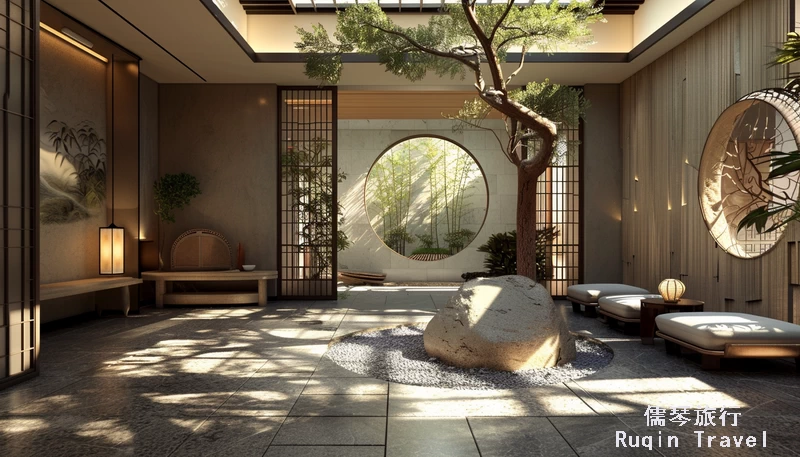Feng Shui, the ancient Chinese art of harmonizing with one’s environment, has fascinated people worldwide. As you plan your visit to China, understanding Feng Shui can enrich your travel experience.
This guide aims to provide you with essential insights into Feng Shui, making it easier for you to appreciate this cultural gem.
Understanding Feng Shui Principles
First, let’s explore the basic principles of Feng Shui. At its core, Feng Shui focuses on balancing energies to ensure health, wealth, and well-being. The term “Feng Shui” literally translates to “wind and water,” symbolizing the flow of life forces.
Yin and Yang
Yin and Yang represent opposing forces that complement each other. In Feng Shui, achieving a balance between these forces is crucial. For instance, Yin might symbolize darkness and stillness, while Yang represents light and activity.
The Five Elements
Additionally, Feng Shui incorporates five elements: Wood, Fire, Earth, Metal, and Water. Each element interacts with others in cycles of creation and destruction. Understanding these elements can help you grasp how Feng Shui practitioners design spaces to enhance positive energy flow.
Feng Shui History
Next, let’s delve into the rich history of Feng Shui. Originating over 3,000 years ago, Feng Shui has roots in ancient Chinese astronomy and geography.
Initially, it was used to orient buildings, ensuring they were in harmony with natural forces. Over centuries, Feng Shui evolved, influencing architecture, urban planning, and interior design in China.
Feng Shui Practices in China
When visiting China, you’ll notice Feng Shui’s influence in various aspects of life. From ancient temples to modern skyscrapers, Feng Shui principles guide the placement and design of structures.
Temples and Historical Sites
Many temples and historical sites in China reflect Feng Shui principles. For instance, the Forbidden City in Beijing was designed with Feng Shui in mind. Its layout ensures harmony and balance, symbolizing the emperor’s control over the universe.
Modern Architecture
Moreover, contemporary Chinese architects often integrate Feng Shui into their designs. Skyscrapers in cities like Shanghai and Hong Kong feature curved edges and specific orientations to enhance energy flow.
Feng Shui Tips for Travelers
As a traveler, you can apply basic Feng Shui principles to enhance your experience in China. Here are some practical tips:
Choosing Accommodations
First, select hotels with good Feng Shui. Look for buildings with a balanced design, avoiding those with sharp corners or obstructed entrances. A welcoming lobby and spacious rooms can also contribute to a positive stay.
Arranging Your Space
Additionally, arrange your hotel room to maximize comfort and energy flow. Place your bed in a commanding position, where you can see the door but are not directly in line with it. This arrangement promotes a sense of security and relaxation.
Exploring Feng Shui in China
Visiting Feng Shui sites in China can be a rewarding experience. These locations offer insights into traditional practices and their modern applications.
Feng Shui Gardens
Feng Shui gardens are perfect examples of harmony between nature and design. The Humble Administrator’s Garden in Suzhou is a prime example. Its layout, incorporating water features, rocks, and plants, creates a serene and balanced environment.
Feng Shui Architecture
The Bank of China Tower in Hong Kong is a modern marvel influenced by Feng Shui. Its sharp angles were controversial, but the building incorporates other elements to balance the overall energy. Exploring such structures can provide a deeper understanding of Feng Shui’s adaptability.
Learning Feng Shui in China
If you’re keen to learn more, consider attending a Feng Shui workshop or consulting a practitioner. Many cities in China offer courses and tours focused on Feng Shui principles.
Workshops and Classes
Workshops provide hands-on learning experiences. You can find classes in major cities like Beijing and Shanghai, where experts teach Feng Shui basics and advanced techniques.
Consulting Practitioners
Alternatively, consulting a Feng Shui practitioner can offer personalized insights. Practitioners can provide advice on how to apply Feng Shui principles in your own life, even after you return home.
Feng Shui and Chinese Culture
Feng Shui is deeply intertwined with Chinese culture. Understanding its role can enhance your appreciation of various cultural practices.
Festivals and Traditions
For instance, Feng Shui influences many Chinese festivals and traditions. During the Chinese New Year, people rearrange their homes and offices to attract good luck and prosperity for the coming year.
Daily Life
In daily life, many Chinese people consult Feng Shui when making significant decisions, such as buying a house or starting a business. Recognizing these practices can give you a unique perspective on Chinese society.
Feng Shui Travel Destinations
Finally, let’s highlight some top Feng Shui travel destinations in China. These locations are not only culturally significant but also embody Feng Shui principles.
Beijing
Beijing, with its rich history and grand architecture, is a great starting point. The Forbidden City and the Temple of Heaven are must-visit sites that showcase traditional Feng Shui design.
Hong Kong
Next, Hong Kong offers a blend of modern and traditional Feng Shui. Explore skyscrapers like the Bank of China Tower and visit traditional temples such as Wong Tai Sin Temple.
Suzhou
Suzhou is famous for its classical gardens, each designed with meticulous attention to Feng Shui. The Humble Administrator’s Garden and the Lingering Garden are perfect for a peaceful retreat.
Guilin
Guilin’s natural landscapes provide a stunning example of Feng Shui in nature. The Li River, with its picturesque scenery, embodies the harmonious balance of elements.
In conclusion, understanding Feng Shui can greatly enhance your travel experience in China. By appreciating its principles, history, and cultural significance, you can gain a deeper connection to this fascinating aspect of Chinese culture.
Whether you’re exploring ancient temples or modern skyscrapers, applying Feng Shui tips can make your journey more enriching and enjoyable. So, embrace Feng Shui as you travel through China and discover the harmony it brings to your adventure.



